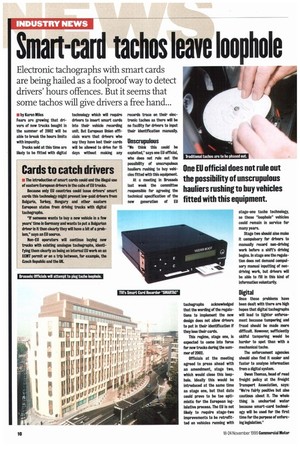Smart-card tachos leave loophole
Page 12

If you've noticed an error in this article please click here to report it so we can fix it.
Electronic tachographs with smart cards are being hailed as a foolproof way to detect drivers' hours offences. But it seems that some tachos will give drivers a free hand...
II by Karen Miles
Fears are growing that drivers of new trucks bought in the summer of 2002 will be able to break the hours limits with impunity.
Trucks sold at this time are likely to be fitted with digital technology which will require drivers to insert smart cards into their vehicle recording unit But European Union officials warn that drivers who say they have lost their cards will be allowed to drive for 15 days without making any records trace on their electronic tactics as there will be no facility for drivers to input their identification manually.
Unscrupulous
"We think this could be exploited," says one EU official, who does not rule out the possibility of unscrupulous hauliers rushing to buy vehicles fitted with this equipment At a meeting in Brussels last week the committee responsible for agreeing the technical specification of the new generation of EU tachographs acknowledged that the wording of the regulations to implement the new design does not allow drivers to put in their identification if they lose their cards.
This regime, stage one, is expected to come into force for new trucks during the summer of 2002.
Officials at the meeting agreed to press ahead with an amendment, stage two, which would close this loophole. Ideally this would be introduced at the same time as stage one, but that date could prove to be too optimistic for the European legislative process. The EU is not likely to require stage-two improvements to be retrofitted on vehicles running with stage-one tacho technology, so these "loophole" vehicles could remain in service for many years.
Stage two should also make it compulsory for drivers to manually record non-driving work before a shift's driving begins. In stage one the regulation does not demand compulsory manual inputting of nondriving work, but drivers will be able to fill in this kind of information voluntarily.
Digital
Once these problems have been dealt with there are high hopes that digital tachographs will lead to tighter enforcement because tampering and fraud should be made more difficult. However, sufficiently skilful tampering would be harder to spot than with a mechanical tacho.
The enforcement agencies should also find it easier and faster to analyse information from a digital system.
Owen Thomas, head of road freight policy at the Freight Transport Association, says: "We're fairly positive but also cautious about it. The whole thing is uncharted water because smart-card technology will be used for the first time for the purpose of enforcing legislation."
















































































































